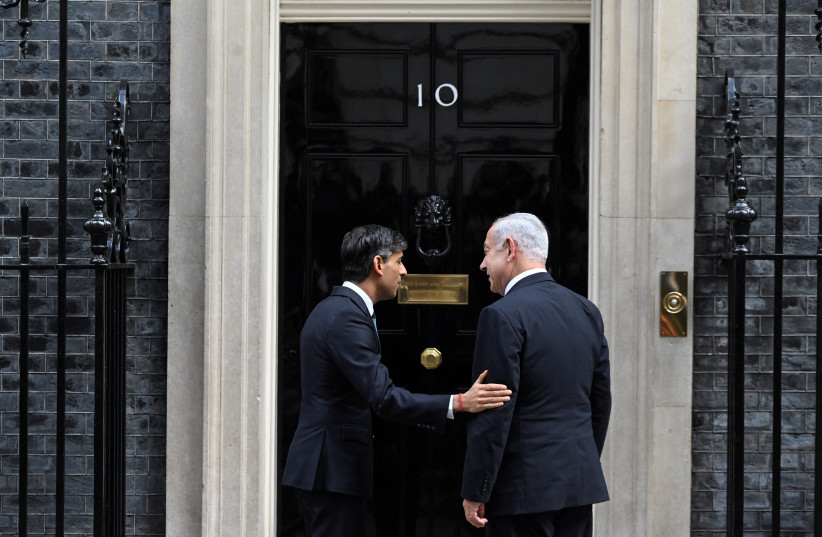Israel didn't violate US agreement, official says, downplays crisis

After the disengagement repeal, the US accused Israel of violating a 2004 agreement, which the official said the US also did not hold to.
Israel didn’t violate any agreements with the United States in the West Bank, a senior official told reporters in London, as he downplayed the crisis with the United States over the issue.
“There was no violation of any obligation Israel has to the United States,” the Israeli senior official said on Friday.
He defended the Knesset vote on March 21 to repeal a section of the 2005 Disengagement Law as it pertained to the sites of the four evacuated settlements in the northern Samaria region of the West Bank.
No intention of rebuilding former settlements
The repeal lifts the ban on the entry of Israelis to the site of those former four settlements Homesh, Sa-Nur, Kadim and Ganim. It helps pave the way for Israel to rebuild those communities.
Prime Minister Benjamin Netanyahu has said, however, that the government has no intention of resurrecting those settlements, a statement which the official echoed.
“The idea that Jews can’t live there has no basis, but from a policy perspective are we going to build four settlements there? No,” the official stated.
After the Knesset vote, US State Department deputy spokesman Vedant Patel accused Israel of violating a 2004 exchange of letters between former Prime Minister Ariel Sharon and former US President George Bush.
In those letters, Sharon promised to evacuate those four settlements and 21 Gaza settlements, a pledge which he kept. Bush in turn committed to recognizing Israel’s right to retain the settlement blocs in any final status agreement with the Palestinians for a two-state solution. But the Obama and the Biden administration have not held to this, the official said.
The United States believes that Israel misinterpreted Bush’s intent. But the Israeli official said that the agreement actually went further than what was on paper and included a promise to “allow construction in the settlement blocks,” a step which Washington never adhered to.
The United States “can’t hold us to an agreement it has not executed,” the official said.
The Biden administration on March 21 did more than hold Israel to that agreement, it also summoned Israel’s Ambassador to the United States, Mike Herzog, to the State Department to express its frustration. That followed public statements of concern the Biden administration has also made about the Israeli government’s judicial overhaul program.
The strain in Israel-US ties
In London, the Israeli official downplayed the extent to which the Disengagement repeal and the government’s judicial overhaul program had created a strain in Israeli-US ties. He did not address the absence of a US invitation for Prime Minister Benjamin Netanyahu to visit the White House. It had been expected that Netanyahu would head there first before embarking on any other trip. Instead, he has made four other trips to France, Italy, Germany and Great Britain.
The official said that Israel and the United States were often at odds when it came to issues regarding the statements, noting that the situation had been much worse when former US President Barack Obama was in office.
The United States has long interfered in Israeli domestic affairs, the official said, noting that it had twice tried to push Netanyahu out of power. The official pointed to a very public admission by former US President Bill Clinton that he had intervened in the 1996 elections in a failed attempt to prevent a Netanyahu victory.
The official spoke with reporters on the sidelines of Netanyahu’s visit Friday to London, where he met with British Prime Minister Rishi Sunak.
Their conversation focused on the pending free trade agreement between the two countries, Russia’s war against Ukraine and Iran’s pursuit of a nuclear weapons program.
Netanyahu explained to Sunak Israel’s position in support of Ukraine, including the provision of humanitarian and economic assistance as well as its absorption of refugees, the official said. Israel has not provided Ukraine with defensive weapons so it can maintain its deconfliction agreement with Russia, whose army operates in Syria. That agreement provides a coordination framework by which the IDF executes aerial operations in Syria against Iranian-based targets "all the time," the official said.
Netanyahu and Sunak discussed Iran and the importance of preventing it from obtaining nuclear weapons, he added.
Great Britain understands the danger of a nuclear Iran, the official said. Israel has urged the international community to do more when it comes to Iran. The US could provide a credible military threat and the European countries could impose sanctions against it, he added.
“We have to do everything to stop a nuclear Iran,” the official said. Israel’s obligation to do so is not contingent on US support, “this has been said very clearly to the Americans,” the official added.
He touted the strength of British-Israel ties and said that the meeting between Sunak and Netanyahu was a positive one.
Netanyahu gave Sunak a copy of his memoir and the British Prime Minister gave him a copy of the book by James Herriot “All Creatures Great and Small.”
Jerusalem Post Store
`; document.getElementById("linkPremium").innerHTML = cont; var divWithLink = document.getElementById("premium-link"); if (divWithLink !== null && divWithLink !== 'undefined') { divWithLink.style.border = "solid 1px #cb0f3e"; divWithLink.style.textAlign = "center"; divWithLink.style.marginBottom = "15px"; divWithLink.style.marginTop = "15px"; divWithLink.style.width = "100%"; divWithLink.style.backgroundColor = "#122952"; divWithLink.style.color = "#ffffff"; divWithLink.style.lineHeight = "1.5"; } } (function (v, i) { });


